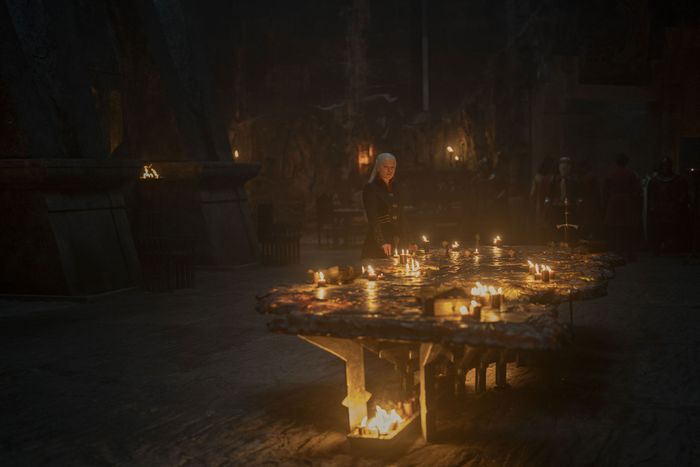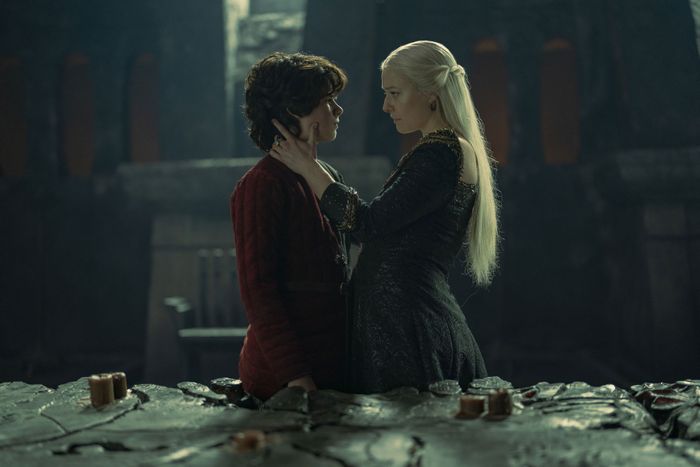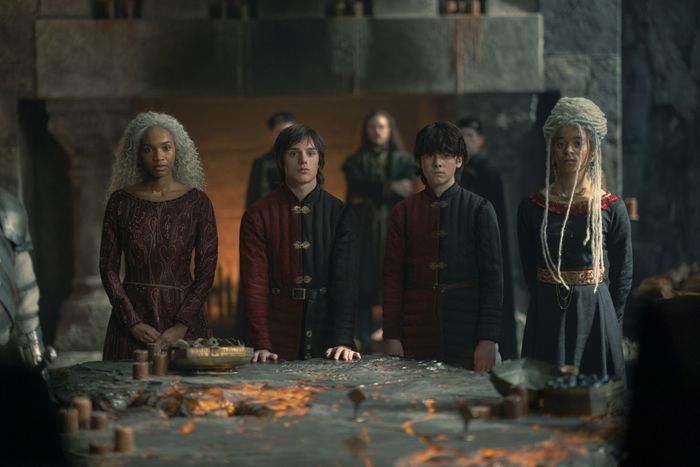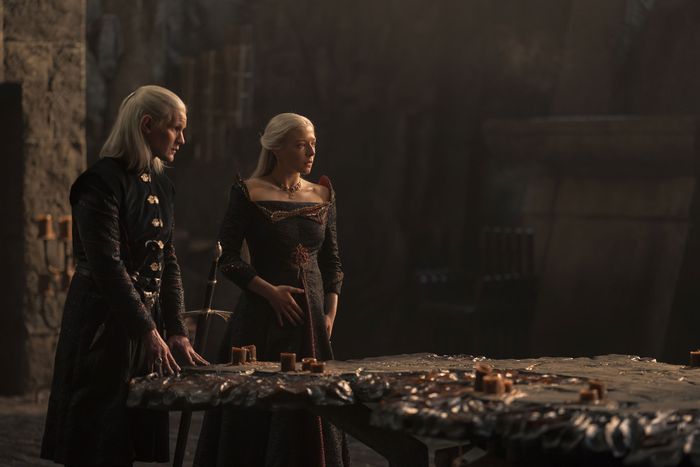
Spoilers ahead for the entirety of House of the Dragon’s first season.
The finale of the first season of House of the Dragon felt like a return to appointment TV — the culmination of a widely watched, highly scrutinized season of television that ends with the promise of bigger and bloodier things to come. The episode will likely be remembered as the one that kicked off the Dance of the Dragons in earnest, but within that are plenty of memorable images and themes to keep us talking until next season. Here, Vulture critics Jen Chaney, Roxana Hadadi, and Kathryn VanArendonk share their biggest questions coming out of “The Black Queen.”
So you’re saying Aemond killed Luke accidentally?
Paddy Considine, in talking about the dragons that helped secure the Seven Kingdoms for the Targaryens for many centuries, described the animals as nuclear weapons: “These things are an abomination, and we should never have made them,” the actor imagined his character, the now-deceased King Viserys I Targaryen, musing. “They give us our power, and without them, we would be nothing. We have to use these nukes responsibly.” Those words rang through my head as I watched “The Black Queen” and its version of the dragon chase between Prince Aemond Targaryen and Prince Lucerys Velaryon. In George R.R. Martin’s Fire & Blood, it’s one of the inciting events in the war between Queen Alicent’s Greens and princess turned queen Rhaenyra’s Blacks. Fire & Blood is written as a partially untrustworthy text, and in the book, this chase and murder are given just a few paragraphs with intentionally ambiguous language.
“If there was a fight, it could not have lasted long” and “Some say Vhagar snatched Lucerys off his dragon’s back and swallowed him whole” are brief but efficient: Luke dies, Aemond is responsible, and “with his death, the war of ravens and envoys and marriage pacts came to an end, and the war of fire and blood began in earnest.” There’s doubt in the book about the length and brutality of the fight, but there’s less uncertainty about Aemond’s culpability: “If he thought to receive a hero’s welcome, he was disappointed,” because of course Aemond expected that!
The Aemond of the book — and the surprisingly adult Aemond played by Ewan Mitchell and his wonderfully indignant cheekbones in House of the Dragon — is ruthless, relentless, and impetuous. He has a giant chip on his shoulder because of the eye Luke sliced years ago (that replacement sapphire is fashion, not function), he believes he should be king, and he has no interest in keeping the peace with his nephews. This man’s entire vibe radiates “You are lesser than me,” and he’s been riding Vhagar, his dragon, for six years at this point. So I do not buy for even one second that he did not intend to kill Luke when he started chasing the boy away from Storm’s End.
House of the Dragon has presented characters as believing one thing or acting in one way and then briefly walking those ideologies back to create short-term drama — and from an acting perspective, I get it. These changes give the ensemble a greater emotional range as they vacillate between heroism and villainy. But on a character-consistency level, this variability doesn’t jibe when Alicent is suddenly shocked her father wanted their son to be king. It doesn’t work with Aemond, either.
Visually, this scene is stupendous: The dragons look the best they have all season, and director Greg Yaitanes and the visual-effects team build tension as Luke and Arrax twist and evade Aemond and the gigantic Vhagar through a thunderstorm. Having both princes lose control of their dragons, though? That’s just silly. Luke has been riding his dragon his whole life, and Aemond is supposedly the greatest warrior in the land — perhaps second only to Daemon now that Corlys is recovering from injury. Sure, getting a sense of Vhagar’s personality (and a reminder that she previously flew to war) echoes what Viserys once said of the dragons’ unpredictability and what Rhaenyra says in this episode about the experience of adult dragons. But that reminder is ultimately attached to a conflicting presentation of Aemond — bullying brute to chastened repentant — and feels like another apologia for the Targaryens’ actions so viewers can root for them instead of against.
House of the Dragon doesn’t need regret running in the Targaryens’ bloodline; there’s no room alongside all that fire. R.I.P. to Lucerys Velaryon, but don’t tell me Aemond wouldn’t be peering over Vhagar’s wing, cracking jokes about whether Luke was really “Strong” now. My suspension of disbelief can only go so far. — Roxana Hadadi
Is this entire show an argument against having children?
Yes, House of the Dragon is a drama about intrafamily strife, the hunger for power among the privileged, and how all one has to do is regurgitate many of the same story beats from Game of Thrones to make an HBO hit. But after Sunday’s finale, I must conclude that House of the Dragon, at least in its first season, is a ten-episode argument against procreation.
As noted by Kathryn VanArendonk in a piece earlier this season, the series has been obsessed from minute one with nightmarish childbirth scenes that involve agonizing deliveries and oft-tragic outcomes for mother, baby, or both. “The Black Queen” continues this trend with Rhaenyra’s delivery of a stillborn child, but she doesn’t merely deliver a lifeless baby — she essentially yanks a tiny, bloodied, not fully realized fetus out of herself. The notion that childbirth is a joyful event is obliterated every time a woman pushes out a kid on this show.
House of the Dragon also implies that even children who emerge happily from the hoo-ha will turn out to be a disappointment. While Rhaenyra’s kids are certainly a massive step up from Alicent’s garbage sons, her firstborns, Jacaerys and Lucerys, are not as naturally skilled at defending themselves as one would hope. Poor Luke is unable to drive his dragon at a crucial moment and dies, bringing even more pain to Rhaenyra. One way to avoid that pain: Don’t have these kids in the first place, man!
If anyone should’ve avoided conceiving, though, it’s Alicent, who, along with the late Viserys, is responsible for bringing Aegon II and Aemond into the world. She and Viserys also sired Helaena, who seems pretty harmless, and Daeron, a person who exists but has not been mentioned once so far on House of the Dragon, which is proof that sometimes kids don’t turn out to be psychopaths but definitely not all the time, and do you really want to chance it?
As soon as they made their first appearances this season, it was abundantly clear that Aegon and Aemond were horrible people (or, as Daemon put it in this episode, “drunken usurper cunts”). Before you point out that Aemond didn’t really mean to kill Luke with his dragon, I will note that after threatening to take one of Luke’s eyes, Aemond chased his half-nephew on the back of a massive dragon while cackling maniacally. It’s not exactly a “whoopsie” that Rhaenyra’s boy wound up dead.
Sure, maybe House of the Dragon is more directly arguing that this system — in which everyone’s main job is to procreate and continue producing heirs — is what’s unsustainable and flawed, especially if certain people are going to willfully mishear the king on his deathbed and try to circumvent that system. But subtextually, all I’m hearing is that every Targaryen and Hightower should tie their tubes, adopt a puppy, and spend the rest of their lives resting in the knowledge that they will never have to grunt their way through a gnarly delivery or receive the news that their kindhearted son has been killed by the evil Hanson brother with a chin that could cut glass. — Jen Chaney
Why did this entire season feel like a prologue? And why wasn’t the prologue … better?
There’s an undeniable feeling of acceleration in House of the Dragon’s finale. In spite of the show’s regular attempts to pump in some exciting violence, that final dragon fight looks like a flag planted in the show’s future. Aemond’s dragon looms above puny little Arrax, and in the end, Aemond can’t control this massive beast. Poor Lucerys gets chomped. It’s really sad! It’s also suddenly realizing, Oh shit, this is what this show wants to be about!
I’m not one of the book readers, so I have very little insight into what’s coming later in this show. But it hasn’t been hard to gather that House of the Dragon is steering its way toward a massive civil war between Rhaenyra and Alicent, and it makes total sense that the series would want to spend lots of time setting up these two characters, explaining who they are and what they want, and laying out the webs of their families. We’ll care about the war so much more if we know who these women are!
Watching “The Black Queen,” though, with Rhaenyra strategizing how to gather her allies and Daemon doing a dragon head count, it’s just so clear that this is the part of the story House of the Dragon has been aching to get to. It leads to a fun finale, and it makes me resent how much the rest of this season felt like the part of board-game night where some guy carefully reads the entire instruction booklet before anyone can start playing. Setup is great! Setup is important! Setup, ideally, should feel less explicitly like setup. I believe it’s possible to multitask, and TV is roomy enough that a ten-episode season can fit in multiple ideas at once. I would’ve loved if House of the Dragon had maybe two or three ideas for this season beyond moving all the pieces into position for later action and time-jumping its way through a checklist of introductory scenes.
Still, if its primary goal was one giant exposition dump, then House of the Dragon should’ve done all that work in a way that meant I knew who the hell these floppy-haired teenagers were before they sailed away on dragons to get slaughtered. I did know Lucerys’s name — thank you to Rhaenys and Rhaenyra for saying it a few times this episode — but, like, who was he? Did he have any distinguishing characteristics as a person? Any hobbies? Favorite foods? A tendency to be overly cautious or lingering trauma from the whole Aemond eye thing? Anything? It is impossible to say! It doesn’t matter because he got chomped.
R.I.P. Lucerys. Your legacy will be that your death ushered in the part of the story House of the Dragon actually wants to tell. — Kathryn VanArendonk




